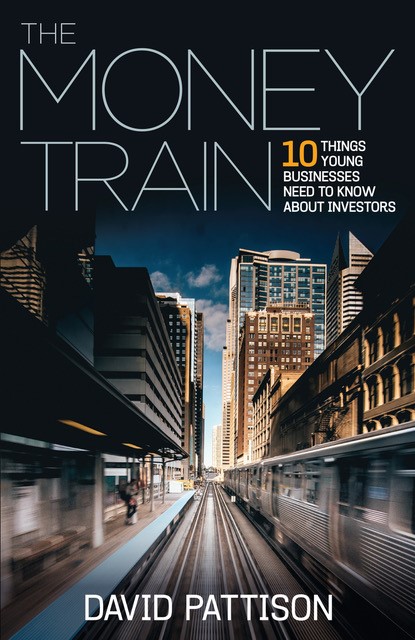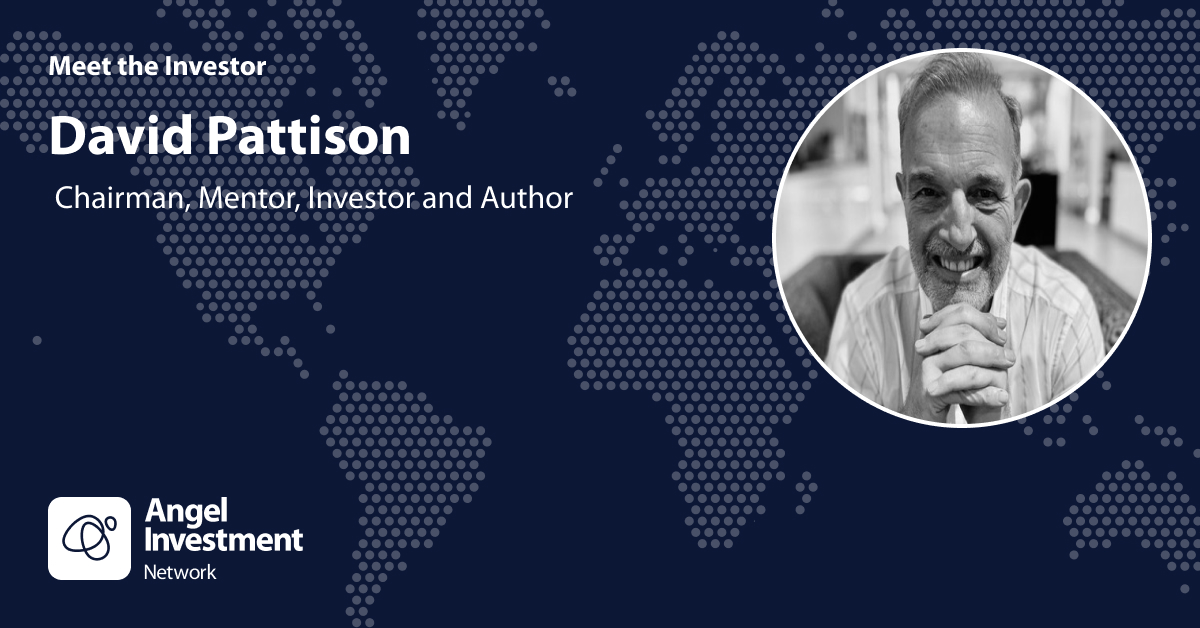David Pattison left school not knowing what he wanted to do. He ‘fell’ into the media side of the advertising industry. With two partners he founded globally renowned advertising business (PHD) and had a successful exit.
For the past decade he has been a hugely successful angel investor, working as a chair, mentor or adviser for a variety of businesses and CEOs. Acting as a ‘wingman’ watching CEOs and companies’ backs and witnessing first-hand the ups and downs of start-up and young company life.
Last year he wrote his first book, The Money Train: 10 things young businesses need to know about investors. It has received rave reviews and award recognition. We are delighted he has shared his insights with us. He discusses the benefits of angel investing, the common traits he looks for in startup founders and what new hurdles entrepreneurs need to clear to win investment in a more challenging climate.
What’s led you to angel investing?
I didn’t wake up one morning and decide to become an investor. It really found me rather than me finding it. I finished with full time executive roles in my mid-fifties and I started helping young businesses in a variety of roles. As they looked to raise money and I got more involved (often as a chair) then if it was a business I liked and had faith in then I would invest. As a result of this I started to get a reputation as not only a source of advice and help but also as a potential investor.
What are the benefits of angel investing?
I think it varies, depending on who you talk to. For myself there are three things that I find as benefits:
– I very rarely invest without some form of ‘mentoring’ involvement in the business, so I get to spend time with good companies and smart, young, bright management teams.
– I no longer want to be a ‘big dog’ so seeing and helping a company grow and succeed and exit gives me real satisfaction.
– Of course, there is the potential financial benefit. EIS and SEIS schemes in the UK mean that if you pick a winner then there is a real financial upside. I am not interested in running my own stock market investment portfolio, so I have built a company investment portfolio instead.
Having said that angel investing is almost always early stage so it is likely that you will get a high failure rate. I reckon over the years that for every ten investments I make then three really fly, a couple make a bit and then three or four are a claim on my tax return. But the ones that really fly make a lot. My best ever was a 40x return. The wins cover all the losses and still give a big profit.
What are the common traits you look for in the start-up founders you back?
It’s a mix of what the company is and what the founder is. I have three criteria when it comes to getting involved in a business or make an investment:
– Can I spend two hours in a room with the people (particularly the CEO)?
– Is it an interesting product?
– Can I make a difference?
I believe I have good instincts and people judgement so with regards to the founders I have over the years added:
-Are they legal decent and honest?
-Are they clear on what they want to achieve?
-Are they passionate about their business?
-Do they listen to my views?
Having said that I sometimes fail to listen to my first instinct, and it usually costs me money!
Are there any red flags in dealing with start-ups that you are potentially going to back?
There are some red flags that I can spot before I invest, unfortunately some are well hidden and occasionally show themselves after investing. These are the pre investment red flags for me:
-When the opening conversation is just about how much and when?
– A team that is rewarding itself too well on other people’s money
– If it’s in a sector I don’t understand fully.
– If it’s going to be an entirely arm’s length investment with bi-annual updates then that doesn’t work for me. It does for a lot of other people who are really only looking for a financial gain. But not for me.
– I find it very hard to invest in businesses where I don’t know the people and/or I am not introduced by someone whose judgement I trust.
– I never invest in Apps. It’s just ‘a thing’ and I am sure I have missed a few good ones.
Our research shows that one of the biggest bugbears of entrepreneurs fundraising is the amount of time it takes from the initial conversation to signing the contract. What advice would you give to entrepreneurs going through the process?
If you want other people’s money then it’s just part of the cost of getting the investment. Too many entrepreneurs think that they are almost ‘owed’ the money and it should come quickly and with few strings attached. Every entrepreneur should respect your potential investors and their money.
Having said that, in the investment process you only need to remember one thing:
– Investors only care about one thing and that is their money and how much money you are going to make them.
If you remember this then you will start to understand why it takes time.
The other thing that a lot of young businesses do is fail to prepare for the fund-raising process.
– Get your finances and your forecasts in shape.
– Make sure you know more about your business and your market than anyone else
– Make sure you have a clear plan for the future and an exit strategy. The plan can, and often will, change over time but a clear route will play well.
– Be clear on how much you need and what it’s for and what the deal is. With Angel investors they will expect you to set the deal parameters, institutional investors usually set it for you.
– Enthusiasm for what you do also goes down really well.
– A good lawyer pays for themselves a thousand times over in this process.
– Don’t let the time it takes lead to deal fatigue, that’s when you agree to clauses that will cause you problems in the future and is often what some unscrupulous investors hope to achieve.
– Young businesses always underestimate how long it takes to raise money and then hitting cash flow issues.
– Leave lots of time to raise money. Even with Angels it can take 6 months.
One final thing to remember, there is a difference between Angel/Individual Investors and Institutional Investors. Angels/Individuals don’t have to invest and are much more likely to pull the plug at the last minute, whereas the Institutional Investors must invest to get their funds fully invested in a certain time frame.
We understand every project is different but looking at your career of investing, roughly how many conversations do you have on average with a founder before you are willing to invest?
As you say every project is different, but I would say that from first conversation to putting the money in it is probably 6-8 conversations. This would include meeting other members of the team and references.
The variables would be:
– Shorter if I know the people or the business.
– Shorter if it’s in a sector I really understand.
– Shorter if there is a role that I really want to do.
– Shorter if my first instinct is really good.
You have been an investor, an entrepreneur, business leader and now an author. What is the one piece of advice you would now give to your younger self starting out on your journey?
Hindsight is such a wonderful and useless thing! Having said that the advice I would give would have been listen to my instincts, be braver, be more confident in my own judgement and don’t invest because you feel you ought to. Oh, and in 1997 put every penny I had into Apple stock!
In this more challenging climate, what new hurdles do entrepreneurs need to overcome to win investment?
In a challenging climate the chances of needing investment money greatly increase. Conversely, whilst there is money around to be had, it becomes harder to get and the chances of running out of cash increase.
Investors become more risk-averse, and while good businesses will always be able to raise money, the valuations can be significantly below market value. Entrepreneurs can end up with less of the business than they feel comfortable with.
Make sure you have a plan B. This would normally be running the business on a break even basis. This might mean having to make hard decisions, particularly around people, but the future of the company will probably rest on this.
If you are struggling to raise money, go back to your shareholders and see if you can do a smaller raise as a bridge to better times. Give the good deal to the people who have supported you in the past.
How long would you spend doing due diligence and what do you look for?
Usually between 4-6 weeks. I have covered a lot of what I look for above, but in the ‘formal’ part of DD, I would look at the following:
– Financial information (P&L, Balance Sheet, cash position and cashflow projection etc)
– Any IP that is in place
– A business plan
– Any legal docs (The proposed investment Agreement, Articles of Association, Shareholders agreements if they exist)
You’ve written an award-winning book, The Money Train, on what young businesses need to know about investors. Why did you decide to write this?
I wrote the book following a particularly drawn-out and bruising fundraising process. It struck me as unfair that just at the point where a young business is at its most inexperienced, it is often negotiating with very experienced investors who may insert clauses that look harmless (or may not even be understood) that come back to haunt the business in the future. I felt that a guide to preparing for the investment process might be useful. Shedding light on what some of these clauses are and how to resist them. It seems that a lot of people have found it really helpful.
David’s award-winning book is The Money Train: 10 Things young businesses need to know about investors. It’s a guide to preparing for the investment process from seed capital to Series A, with lots of real-world examples.

Join the world’s largest angel investment network, where global angel investors meet the great businesses of tomorrow.

